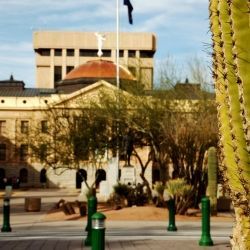April 24, 2025
TOP LINE UPDATE
April 22 marked the 100th day of the 2025 legislative session, with no end in sight. Last week Governor Hobbs issued a bill signing moratorium until Legislative Republicans pass a developmental disabilities funding bill with no strings attached. After several false starts, the House of Representatives overwhelmingly passed a bill to fund the program. The bill has to clear the Senate, where it's fate is uncertain, before going to the governor to sign.
Meanwhile, one of the last bills to receive the governor's signature was SB 1543 - dubbed the "Axon bill." The new law nullifies the effort by opponents of the Axon development in Scottsdale from referring the rezoning to the 2026 ballot.
The Finance Advisory Committee met last week, with economists underscoring the uncertainty of the state's revenues and budget. The meeting - which does not included legislators - comes at a time as lawmakers and the governor's office remain at odds on the Fiscal Year 2026 budget.
EPA Administrator Lee Zeldin has rescinded previous guidance that would have negatively impacted Maricopa County for air quality standards by penalizing the region for pollution outside the state's control. The move comes after Administrator Lee met with Arizona business leaders, Senator Mark Kelly, and local policymakers, and will reduce uncertainty around the fate of advanced manufacturing and other industries key to national security in Maricopa County. Read Zeldin's statement.
The International Monetary Fund forecasts a 40% chance of global recession due to escalating tensions and high uncertainty with policy. Gold prices hit a record high, driven by investors seeking safety in foreign central bank purchases.
Starting November 2025, SRP's rates will increase, with general service plans increasing 2.7% and large general service plans increasing 4.4%. However, both plans will see a decrease in the fuel and purchased power adjustment mechanism (FPPAM) of 1.4% and 3.5%, respectively. Residential customers can expect to see a 3.5% increase. See details.
STATE LEGISLATURE & POLITICS
So far this session, Governor Hobbs has vetoed 52 bills and signed 92.
House and Senate Republicans introduced a bill to fund the developmental disability program, but the proposal was derided by Democrats and the governor in its initial form. House Democrats voted no on all legislation before the body on April 17 as a protest against the funding measure's lack of bipartisan support.
The disagreement over HB 2945 (developmental disabilities; appropriations; waivers) ultimately led Governor Hobbs to issue a bill moratorium until all sides come to an agreement, meaning she plans to veto any bills passed by the Legislature until they send a version of funding she supports. On Apr. 23, the House passed a funding bill to fill the $122 million shortfall for the program, sweeping funds from the Prescription Drug Rebate Fund. In addition to funding the program, the bill adds requirements and reporting for the Parents as Paid Caregivers Program and includes a requirement to obtain legislative approval before submitting waivers, renewals or amendments to the Centers for Medicare & Medicaid Services.
Former Farm Bureau director Paul Brierley's confirmation to lead the Arizona Department of Agriculture is being slow-walked after senators raise concerns over his 2020 comments about President Trump. He received a 3-2 vote out of the nominations committee, but has not been scheduled for a vote of the full Senate.
Seven director nominees are still awaiting consideration from the Senate's nomination committee, while Governor Hobbs' latest pick for the Department of Child Safety, Kathryn Ptak, is set for a hearing this week. Ptak previously served as assistant attorney general for the Department of Economic Security, and later served as the director of the Board of Executive Clemency under Governor Doug Ducey from 2019 to 2022.
Senator TJ Shope continues his stakeholder meetings on the ag-to-urban proposal, although the agriculture community, water providers, developers and the Department of Water Resources remain at odds over the fundamentals of what the policy should look like.
Governor Hobbs' campaign boasted a $1.1 million haul in the first quarter of 2025, with Republican Karrin Taylor Robson at $850,000 and Congressman Andy Biggs bringing in just over $200,000. Club for Growth, a conservative group, released results from a poll of 511 likely republican voters, showing Biggs leading Robson 45% to 16%. The poll shows Biggs trailing Hobbs in a general election contest 42% to 46%, and Robson 38% to Hobbs' 47%. Meanwhile, Noble Predictive Insights' poll showed Hobbs at 40% with Biggs at 38%, and Hobbs at 43% to Robson's 35%. Other polls conducted show varying levels of support for Republican potential candidates like Jack McCain, Turning Point's Charlie Kirk, State Sen. Jake Hoffman and Treasurer Kimberly Yee. Adding to the uncertainty of the 2026 gubernatorial race is the addition of the position of Lieutenant Governor.
STATE BUDGET & ECONOMY
The Finance Advisory Committee, a group of private and public sector economists who present their views on the condition of the U.S. and Arizona economies, met earlier this month to present on the state and national economies.
Economists from the Joint Legislative Budget Committee (JLBC) noted that tariffs, federal spending levels and federal tax policy were three major areas of uncertainty that could have significant impacts on Arizona and the state's revenues. JLBC also noted that the projected funding balance for FY 2026 has fallen to $277 million, down from earlier estimates of $612 million. Although they do not predict a recession, their stress test scenarios predict the state's budget shortfalls outsizing the state's rainy day fund, which has a balance of $1.6 billion.
David Livingston (R-Peoria), Arizona House of Representative Appropriations Committee Chair, estimates that the potential federal cuts to Arizona range from $1 billion to $3 billion, with the most extreme being $10 billion. It's unclear the extent to which the cuts would impact Arizona, as nearly every state agency receives federal monies.
The March revenue collections for the state were $45 million below the January forecast, with individual income tax down $18 million, corporate income tax down $17 million, and sales tax down $20 million. Overall, however, the state saw a $15 million cumulative gain since January. The state's general fund revenues from taxes are 48% sales tax, 33% income tax, 10% corporate income tax, and 5% insurance premium tax, with the remaining tax revenues coming from "luxury" or "sin" taxes.
LOCAL GOVERNMENT
The City of Phoenix is updating its historic preservation plan, which is expected to go before the City Council in September. Goals include exploring preservation incentives, increasing awareness and creating a city-affiliated nonprofit dedicated to historic preservation.
Maricopa County is updating its Comprehensive Plan, which covers land use, transportation, housing among other policy areas. The county and supervisorial districts are holding open meetings to receive public comment on updating the plan. Learn more and RSVP to attend sessions.
The City of Mesa is inviting residents to learn more and provide feedback on their Fiscal Year 2026 budget. The council will host two informational sessions on May 7 and 14. Learn more.
The Town of Gilbert approved sewer rate increases - in some instances up to 95% - to replace aging water and sewer infrastructure. The council approved the plan to fully fund repairs, replacement and maintenance without incurring debt.
The City of Surprise released updates to its engineering standards. View the standards here.
LEGISLATION WE'RE TRACKING
SB 1543 (ancillary use; international headquarters campus - Sen. Carroll): Mandates municipalities with population between 200,000 and 500,000 permit hotel and multifamily residential as ancillary use in industrial zoned districts for headquarter of international corporations.
NAIOP Position: Support
Status: SIGNED INTO LAW
HB 2110 (development; adaptive reuse; rezoning; prohibition - Rep. Biasiucci): Requires at least 10% of existing commercial, office or mixed-use be allowed for adaptive reuse. Prohibits a municipality from designating specific parcels to qualify. Clarifies sound level language.
NAIOP Position: Support
Status: SIGNED INTO LAW
HB 2447 (self-certification program; administrative review - Rep. Carbone): Requires municipalities to allow for administrative review of site plans, development plans, and lot adjustments without public hearings. Allows municipalities to adopt programs for architects and engineers to self-certify.
NAIOP Position: Support
Status: SIGNED INTO LAW
SB 1286 (counties; board; administrative review; approval - Sen. Gowan): Adds assurances to the list of administrative approvals that do not require public hearings. Allows authorized employees to review and approve subdivision plats.
NAIOP Position: Support
Status: SIGNED INTO LAW
SB 1050 (GPLET; notice; abatement period - Sen. Leach): Limits development agreements under the GPLET program and excludes school district taxes from the abatement.
NAIOP Position: Oppose
Status: VETOED
HB 2679 (power; public utilities; UCC; securities - Rep. Griffin): Allows utilities to initiate securitization transactions and establishes a framework for utilities to adopt financing resolutions, submit proposals and conduct public comment.
NAIOP Position: Support
Status: Awaiting Full Senate
SB 1523 (water use; prohibition; landscaping - Sen. Dunn): Prohibits a municipality from requiring specific number of trees, plants, turf or lot coverage for developments.
NAIOP Position: Support
Status: Awaiting Full Senate
HB 2201 (wildfire mitigation planning; utilities; approval - Rep. Griffin): Establishes legal framework for liability related to wildfires. Utilities are required to submit mitigation plans on a biennial basis and approved by either the Corporation Commission or the utility's board.
NAIOP Position: Support
Status: Awaiting Full Senate
HB 2594 (GRRC; continuation - Rep. Blackman): Continues the Governor's Regulatory Review Council for two years. Modifies the composition of GRRC and the appointment process. Prohibits GRRC from adopting a rule when in study session, and allows any person to petition GRRC to review agency practice, policy or requirement.
NAIOP Position: Monitor
Status: Awaiting Full Senate
IN OTHER NEWS
- Governor rejects fast-track for small modular nuclear reactors in Arizona
- Last-minute deal poised to avert crisis for 60,000 Arizonans with developmental disabilities
- DOGE takes some Arizona leases off the cancelation list
- GOP threatens 2026 ballot measure after Hobbs vetoes "Arizona ICE Act"
- Valley cities are increasing water rates
- Tariffs, Medicaid divide Arizona lawmakers
- Data center boom tests Arizona's power grid
- San Tan Valley residents pass incorporation milestone
- President Trump makes second endorsement in Arizona governor's race
- Jay Feely to run for Congress
- Groundwater and soil at Phoenix site officially off of Arizona list of contaminated locations
NAIOP Arizona advocates for public policy at all levels of government to help grow the economy and drive demand for commercial real estate in greater Phoenix and throughout Arizona. Email policy@naiopaz.org for questions.








